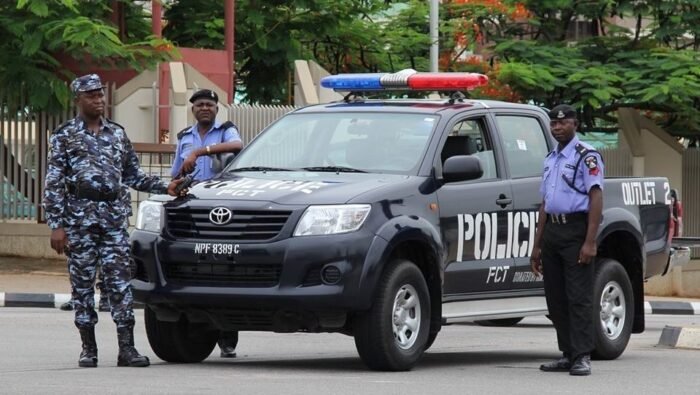
The Nigerian Police force (See the Police Updated Salary Structure) is a para military security agency established in 1930 by Great Britain. The Nigerian Police was established to help in the fight against crimes and to maintain law and order in Nigeria. The Police Force is managed by the Police Service Commission (Check out this Post to know more).
The Nigerian Police work in Collaboration with military agencies like the Nigerian Army in ensuring the security of the country. Although the ranking structure of the police is different from that of the Nigerian Army, there are some areas of comparison.
The Nigerian Army (See all the ranks in the Nigerian Army) is a member of the trio-military complex; which includes the Navy and the Air Force. The Army was established to help protect the Federal Republic of Nigeria from external aggression, and also fight against terrorism.
Over the years, the Nigerian Army has been engaged in war both at home and abroad. The Nigerian Army was specifically commended by the United Nations for its conduct and professionalism in the Liberia peace missions.
The Structure of the Nigerian Army Ranks
The ranking structure of the Nigerian Army (See what it takes to pass through NDA as an Army officer), is divided into two sections;
Junior officers
The minimum qualification for recruitment into the junior officers’ cadre of the Nigerian Army is an O Level Certificate. The Junior officers pass through a six months intensive training at the Officers training college in Jaji, Zaria. The Junior Officer cadre is divided into tradesmen and Non-Tradesmen. Tradesmen are applicants who possess certificates other than the O level result. NCE and Diplomas are classified as trades.
Officers recruited as tradesmen start as Corporals instead of Recruits, thereby skipping two ranks as against their Non-Tradesmen counterparts.
Below is the ranking structure of the Nigerian Army’s Junior officers’ cadre.
- Recruit
- Lance Corporal
- Corporal
- Sergeant
- Staff Sergeant
- Warrant Officer
- Master warrant Officer
- Army Warrant Officer
Senior officers
Graduates of the Apex Military Institution, Nigerian Defense Academy mostly occupy the senior officers’ cadre of the Nigerian Army. After a 5 years degree program at the Nigerian Defense Academy cadets are recruited into the Army as Seconds Lieutenants or Lieutenants.
There are also provisions for those who possess degrees from Non-Military Institutions to be recruited into the officer’s cadre of the Nigerian Army through what is referred to as short service recruitment.
The short service recruitment is aimed at recruiting professionals who will meet the professional needs of the Army. The Short Service is divided into combat and Noncombat.
The combat scheme is meant for anyone with any degree certificate from recognized institutions, while the non-combat is meant for professionals like Engineers, Teachers, Medical Doctors, and others.
Below is the ranking structure of the senior officers’ cadre of the Nigerian Army.
- Second Lieutenant
- Lieutenant
- Captain
- Major
- Lieutenant Colonel
- Brigadier
- Major General
- Lieutenant General
- General
- Field Marshal
Note: The Field marshal is the highest rank anyone can attain in the Army globally, and no one has ever attained this rank in Nigeria.
The Structure of the Nigerian Police Rank
Junior Officers and their Ranks
These are officers who are recruited through the constable recruitment platform of the Nigerian Police. The minimum academic qualifications for recruitment into the Nigerian Police is an O Level result. Possession of a trade certificate is also an added advantage. The junior officer cadre is required to go through 3 months of training on various courses before they are fully inducted into the Nigerian Police.
Below is the ranking structure for the Nigerian Police Force.
- Constable
- Corporal
- Sergeant
- Sergeant major
- Cadet Inspector
- Unconfirmed Inspector
- Confirmed Inspector
- Principal Inspector
- Chief Inspector
Senior officers
This is the senior officers’ cadre of the Nigerian Police. Potential cadets which are referred to as ‘applicants’ will undergo training before their recruitment into the Nigerian Police Academy for a 4 years degree program. The Officer cadre is also open to those who possess degrees from Non-Police institutions.
Below is the ranking structure for the senior officers’ cadre of the Nigerian Police.
- Cadet Assistant Superintendent
- Assistant Superintendent on Probation
- Assistant Superintendent
- Deputy Superintendent
- Superintendent
- Chief Superintendent
- Assistant Commissioner
- Deputy Commissioner
- Assistant Inspector General
- Deputy Inspector General
- Inspector General; Highest rank in the Nigerian Police.
Comparing the Junior Army officers versus the junior police officer ranks
Army Junior Officers Ranking Structure |
Police Junior Officers Ranking Structure |
| 1. Recruit2. Lance Corporal
3. Corporal 4. Sergeant 5. Staff Sergeant 6. Warrant Officer 7. Master warrant Officer 8. Army Warrant Officer |
1. Constable2. Corporal
3. Sergeant 4. Sergeant major 5. Cadet Inspector 6. Unconfirmed Inspector 7. Confirmed Inspector 8. Principal Inspector |
Comparing the Senior Army Officers versus the Senior Police Officers
Army Senior Officers Ranking Structure |
Police Senior Officers Ranking Structure |
| 1. Second Lieutenant2. Lieutenant
3. Captain 4. Major 5. Lieutenant Colonel 6. Brigadier 7. Major General 8. Lieutenant General 9. General 10. Field Marshal |
1. Cadet Assistant Superintendent2. Assistant Superintendent on Probation
3. Assistant Superintendent 4. Deputy Superintendent 5. Superintendent 6. Chief Superintendent 7. Assistant Commissioner 8. Deputy Commissioner 9. Assistant Inspector General 10. Deputy Inspector General 11. Inspector General |
Abbey Johnson has a Masters degree as an engineer and has over 3 years of teaching and research experience. He is happiest when on a bike and is also interested in electric energy and computer Science.

